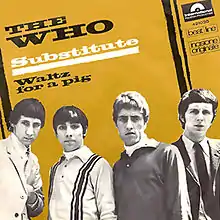Substitute (The Who song)
"Substitute" is a song by the English rock band The Who, written by Pete Townshend. Released in March 1966, the single reached number five in the UK and was later included on the compilation album Meaty Beaty Big and Bouncy in 1971.[4] In 2006, Pitchfork ranked "Substitute" at number 91 on the "200 Greatest Songs of the 1960s".[5]
| "Substitute" | ||||
|---|---|---|---|---|
 Cover of the 1966 Italy single | ||||
| Single by The Who | ||||
| B-side |
| |||
| Released | 4 March 1966 (UK) 5 April 1966 (US) | |||
| Recorded | 12 February 1966 | |||
| Studio | Olympic Studios, London | |||
| Genre | Power pop[1][2][3] | |||
| Length | 3:47 2:59 (US) | |||
| Label | Reaction (UK) Atco (US) | |||
| Songwriter(s) | Pete Townshend | |||
| Producer(s) | Pete Townshend | |||
| The Who singles chronology | ||||
| ||||
| Audio sample | ||||
"Substitute"
| ||||
Inspiration and writing
"Substitute" was primarily inspired by the 1965 soul single "The Tracks of My Tears" by Smokey Robinson and the Miracles. Pete Townshend became obsessed, particularly, with the line, "Although she may be cute/She's just a substitute." This had then led Townshend "to celebrate the word with a song all its own."[6]
The riff used in the song's verses was derived from a November 1965 single by Robb Storme and The Whispers called Where Is My Girl, a fact later acknowledged by Townshend who recalled hearing the record whilst reviewing singles for the Melody Maker's 'Blind Date' column.
The guitar solo is played by bassist John Entwistle who later said: 'I played a Gibson SG medium scale bass with wire-wound strings. When it got to the solo, because we were recording and mixing it virtually live, I thought, yeah, this should be a bass solo, so I turned my volume up and they couldn’t mix me out, so it ended up as a bass solo.'
For the American single, released in April 1966, the line in the chorus “I look all white but my dad was black” was changed to “I try walking forward but my feet walk back.”[4] The complete second verse and chorus were also edited from the US release, reducing the track's length to two minutes and fifty-nine seconds.[7]
Performance history
The song remains a familiar fan-favourite and was performed at most of their concerts.[3] "Substitute", along with "I Can't Explain", have served as the group's opening numbers since 1971.[8] It appears on the Live at Leeds album, as well as Live at the Isle of Wight Festival 1970.[9]
On the album Live at Leeds, Townshend comments on the song by saying:
We'd like to play three hit singles from our past for ya. Three selected hit singles, the three easiest. There's "Substitute", which we like. [crowd cheers] Thank you. That was our first number four [crowd laughs]...[10]
In 1976, radio pirates interrupted BBC programmes in the south and southwest of England by overpowering a feeder station in Wrotham, Kent. The fake program, which started at 11:00pm and ran for 35 minutes before government engineers regained control, fittingly began with "Substitute".[11]
Chart performance
Weekly charts
| Chart (1966) | Peak position |
|---|---|
| Belgium (Ultratop 50 Flanders)[12] | 17 |
| Netherlands (Single Top 100)[13] | 2 |
| UK Singles (OCC)[14] | 5 |
| West Germany (Official German Charts)[15] | 13 |
| Chart (1976) | Peak position |
|---|---|
| UK Singles (Official Charts Company)[16] | 7 |
References
- Theo Cateforis (7 June 2011). Are We Not New Wave?: Modern Pop at the Turn of the 1980s. University of Michigan Press. p. 129. ISBN 978-0-472-03470-3.
- Moerder, Adam (16 August 2006). "The 200 Greatest Songs of the 1960s – Part Three: #100-61". Pitchfork Media. Retrieved 15 November 2015.
- Unterberger, Richie. "Substitute – Song Review". Archived from the original on 7 April 2011. Retrieved 2014-05-09.CS1 maint: bot: original URL status unknown (link). AllMusic. Rovi.
- John Atkins (2000). The Who on Record: A Critical History, 1963-1998. McFarland. p. 324. ISBN 978-0-7864-0609-8.
- Staff, Pitchfork (August 16, 2006). "The 200 Greatest Songs of the 1960s". Pitchfork Media. Condé Nast. Retrieved November 15, 2015.
- "Smokey Robinson and the Miracles, 'The Tracks of My Tears'". Rolling Stone. Wenner Media. April 7, 2011.
- Mike Segretto (1 March 2014). The Who FAQ. Backbeat Books. p. 187. ISBN 978-1-4803-9252-6.
- Chris Charlesworth; Ed Hanel (2004). The Who: The Complete Guide to Their Music. Omnibus Press. p. 16. ISBN 978-1-84449-428-6.
- Janovitz, Bill. The Who - Substitute at AllMusic. Retrieved November 15, 2015.
- The Who - Uncensored on The Record. Coda Books Ltd. p. 40. ISBN 978-1-908538-83-3.
- Pirate Radio Stations: Tuning In To Underground Broadcasts. TAB Books. 1990. p. 90. ISBN 0-8306-9268-1.
- "Ultratop.be – The Who – Substitute" (in Dutch). Ultratop 50. Retrieved 15 November 2015.
- "Dutchcharts.nl – The Who – Substitute" (in Dutch). Single Top 100. Retrieved 15 November 2015.
- "Official Singles Chart Top 100". Official Charts Company. Retrieved 15 November 2015.
- "Offiziellecharts.de – The Who – Substitute". GfK Entertainment Charts. Retrieved 26 March 2019. To see peak chart position, click "TITEL VON The Who"
- The Who – Official Chart History